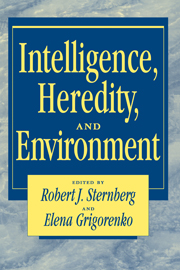Book contents
- Frontmatter
- Contents
- List of contributors
- Preface
- Part I The nature–nurture question: New advances in behavior-genetic research on intelligence
- Part II Novel theoretical perspectives on the genes and culture controversy
- Part III Specific issues in the nature–nurture controversy
- 12 Educating intelligence: Infusing the Triarchic Theory into school instruction
- 13 Raising IQ level by vitamin and mineral supplementation
- 14 The resolution of the nature–nurture controversy by Russian psychology: Culturally biased or culturally specific?
- 15 The emerging horizontal dimension of practical intelligence:Polycontextuality and boundary crossing in complex work activities
- 16 Cognitive development from infancy to middle childhood
- 17 Intelligence, language, nature, and nurture in young twins
- 18 Sources of individual differences in infant social cognition:Cognitive and affective aspects of self and other
- Part IV Integration and conclusions
- Name index
- Subject index
17 - Intelligence, language, nature, and nurture in young twins
Published online by Cambridge University Press: 05 June 2012
- Frontmatter
- Contents
- List of contributors
- Preface
- Part I The nature–nurture question: New advances in behavior-genetic research on intelligence
- Part II Novel theoretical perspectives on the genes and culture controversy
- Part III Specific issues in the nature–nurture controversy
- 12 Educating intelligence: Infusing the Triarchic Theory into school instruction
- 13 Raising IQ level by vitamin and mineral supplementation
- 14 The resolution of the nature–nurture controversy by Russian psychology: Culturally biased or culturally specific?
- 15 The emerging horizontal dimension of practical intelligence:Polycontextuality and boundary crossing in complex work activities
- 16 Cognitive development from infancy to middle childhood
- 17 Intelligence, language, nature, and nurture in young twins
- 18 Sources of individual differences in infant social cognition:Cognitive and affective aspects of self and other
- Part IV Integration and conclusions
- Name index
- Subject index
Summary
The relation between intelligence and language is complex. If intelligence is defined as the ability to solve problems, generate creative ideas, recognize emergent categories and patterns, or simply as processing power or speed of neural conduction, then language can be viewed as a secondary process in that it merely serves to communicate the workings of the intelligent mind. This language-independent conceptualization of intelligence can be contrasted with a language-dependent perspective, in which verbal skill per se is an integral aspect of intelligence. From the language-dependent perspective, intelligence includes abilities such as knowledge of word meanings, mastery of grammar and syntax, and skilled articulation of ideas.
Verbal and nonverbal skills co-occur in normal adults, and efforts to separate them are problematic: Most verbal tasks tap underlying nonverbal skills, and tasks that seem nonverbal may be influenced by verbal mediation of instructions or ongoing processes. However, from a developmental perspective, separating verbal and nonverbal skills is obvious and necessary. In the first year, most human infants begin to babble, use gestures, and understand and say a few words, but these activities pale in comparison to the infant's interest in object manipulation, locomotion, and visual exploration. Our terminology for the first year of life evokes this relative lack of language – the word infant is from the Latin infans, meaning “incapable of speech.” Infants do communicate, but their linguistic investment seems relatively minor in comparison to their other abilities and to the prodigious advances in language that characterize the second year.
- Type
- Chapter
- Information
- Intelligence, Heredity and Environment , pp. 483 - 504Publisher: Cambridge University PressPrint publication year: 1996
- 1
- Cited by



